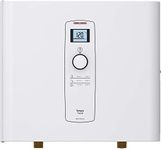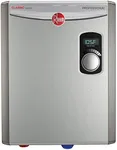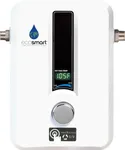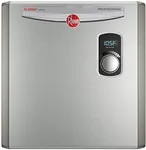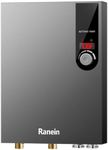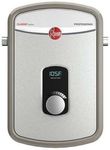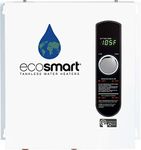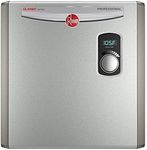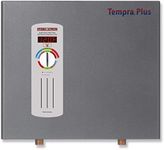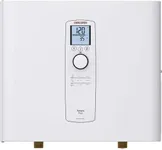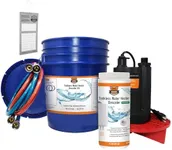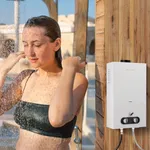Buying Guide for the Best Tankless Electric Hot Water Heaters
Choosing the right tankless electric hot water heater can significantly impact your comfort and energy efficiency at home. These devices provide hot water on demand, which means you don't have to worry about running out of hot water or wasting energy on heating water that you don't use. To make an informed decision, it's important to understand the key specifications and how they relate to your needs.Flow RateFlow rate, measured in gallons per minute (GPM), indicates how much hot water the heater can produce at a time. This is crucial because it determines whether the heater can meet your household's hot water demands. For example, a flow rate of 2-3 GPM is suitable for a small household with one or two people, while a larger household with multiple showers and appliances running simultaneously might need a flow rate of 5-7 GPM or higher. Assess your household's hot water usage to determine the appropriate flow rate for you.
Temperature RiseTemperature rise refers to the increase in water temperature that the heater can achieve. This is important because it affects how hot the water will be when it reaches your tap. The temperature rise needed depends on the incoming water temperature and your desired hot water temperature. For instance, if your incoming water is 50°F and you want it to be 120°F, you need a heater that can provide a 70°F temperature rise. Consider your local water temperature and your hot water needs to choose a heater with the right temperature rise capability.
Power RequirementsTankless electric water heaters require a certain amount of electrical power to operate, typically measured in kilowatts (kW). This is important because it affects the heater's performance and your home's electrical system. Lower power heaters (around 10-15 kW) are suitable for smaller households or single-point applications, while higher power heaters (20-30 kW or more) are needed for larger households or whole-house applications. Check your home's electrical capacity and consult with an electrician if necessary to ensure compatibility.
Energy EfficiencyEnergy efficiency, often expressed as a percentage, indicates how effectively the heater converts electrical energy into hot water. Higher efficiency means less energy waste and lower utility bills. Most tankless electric water heaters have efficiency ratings between 90% and 99%. If energy savings are a priority for you, look for a model with a higher efficiency rating. However, even a slightly lower efficiency model can be a good choice if it meets your other needs and is more affordable.
Size and InstallationThe physical size of the tankless water heater and its installation requirements are important considerations. These heaters are generally compact, but you need to ensure you have enough space for installation and proper ventilation if required. Additionally, some models may require professional installation due to electrical or plumbing requirements. Consider where you plan to install the heater and whether you need professional help to ensure a smooth installation process.
Warranty and SupportThe warranty and support offered by the manufacturer can provide peace of mind and protect your investment. Warranties typically cover parts and labor for a certain period, ranging from a few years to a decade or more. Good customer support can also be valuable if you encounter any issues or have questions about your heater. Look for a model with a comprehensive warranty and positive reviews regarding customer service to ensure you have support if needed.
